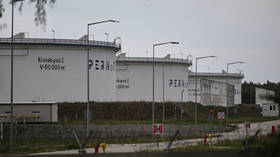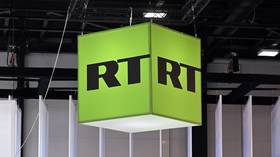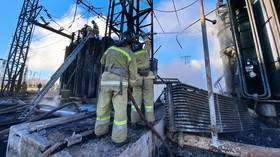EU country investigating ‘sabotage plot’ targeting Russian oil supplies – media

National security authorities in Hungary are investigating a possible sabotage plot targeting the Russian Druzhba oil pipeline, the Magyar Nemzet newspaper reported on Monday. The pipeline carrying Russian crude to landlocked countries in Central Europe was at the center of a spat between Budapest and Brussels over the summer.
Hungary’s Anti-Terrorism Center was alerted by authorities in neighboring Slovakia over the weekend that “an organized group” was operating in both countries carrying out “field survey” in the vicinity of the pipeline. The activities could indicate “possible preparations for a terrorist attack” against the countries’ critical infrastructure, wrote the paper.
“Unfortunately, the Slovak announcement had to be taken seriously” by the Anti-Terrorism Center and the national security services, the report added.
Built in the 1960s, the Druzhba pipeline stretches some 4,000km (2,485 miles) and connects Russian and Kazakh oil suppliers with consumers in Europe. The pipeline branches off in Belarus, with the northern part going to Poland and Germany, and the southern branch to Ukraine, Hungary, Slovakia, and the Czech Republic.
In June, Ukraine halted the transit of crude supplied by Russian energy giant Lukoil via the pipeline, citing its own sanctions on the company. The measure has directly hit landlocked Hungary and Slovakia, depriving them of oil previously exported by the company through Ukrainian territory. Lukoil’s supply was reportedly replaced by that of another Russian oil firm, Tatneft.
Hungarian Foreign Minister Peter Szijjarto in July accused Brussels of orchestrating the suspension of Lukoil’s supply to blackmail the two states. Slovakia and Hungary are the only EU members that have rejected the bloc’s policies on supplying Kiev with military aid amid the conflict with Moscow. Both states have repeatedly called for the crisis to be solved through diplomacy.
In September, Hungarian energy company MOL reached a deal with suppliers and pipeline operators. Under its terms, the crude shipped via Ukraine would be officially sold to MOL before it crosses the country’s border.
Ukrainian leader Vladimir Zelensky’s top adviser, Mikhail Podoliak, said at the time that Kiev will honor its agreements and transit Russian oil to Europe until the contracts expire in 2029.
The Washington Post reported last year that Zelensky secretly plotted a range of steps that contradicted his official statements at the time. The outlet cited classified US intelligence documents that detailed Zelensky’s plans to enter Russia and occupy villages along the border, to push for permission to use Western long-range missiles to hit targets inside Russia’s borders, and to bomb a pipeline that transfers Russian oil to Hungary.
The first part of the plan has materialized in recent months with Kiev’s offensive in Russia’s Kursk Region and the permission by the US, the UK, and France to launch their long-range missiles deep into Russia.














